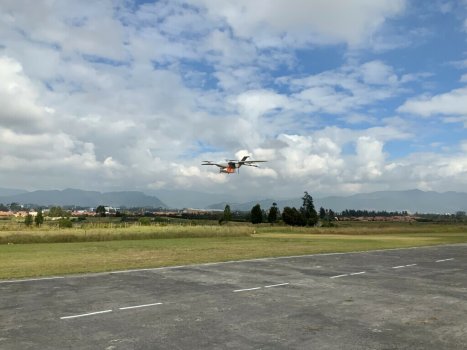K
Kathleen Martin
Guest
For a few years now we have been waiting anxiously for the day that online retailers can send us our orders the same day using an unmanned aerial vehicle (UAV). Unfortunately, the years keep coming and going, and even though we are making progress, and the Federal Aviation Administration (FAA) seems willing to allow it, we are not there yet.
At the same time, great progress is being made in the beyond visual line of sight (BVLOS) arena, which many consider the holy grail of full deployment for drones and air taxis. So, it is safe to say that we are closer to receiving a pack of pencils that we ordered in the morning and that everyone working to make it happen is really busy trying.
But how about a pint of blood that is needed to save a life but is six miles away in a city with hours of delays on the ground because of traffic jams and incomprehensible road rules? The perspective changes when lives are at stake and the deployment of unmanned platforms can be the difference between life and death.
A few companies around the world are having great success with medical deliveries in developing countries and areas with uncrowded skies, such as Zipline in Africa. With almost 2.5 million deliveries of critical medical supplies to remote locations and over 19 million miles flown, Zipline’s business model seems scalable and is creating a rich database of pain points that need to be addressed before we move the processes and procedures to urban national airspaces with heavy concentration of commercial and general aviation flights.
Another company working to create a scalable, replicable business model in the medical delivery service is ORKID, which is beginning to take the first steps towards regular deliveries of medical supplies between corporate entities, such as wholesale and online pharmacies, urban hospitals, and regional health centers. We reached out to Santiago Pinzon, CEO and Co-founder of ORKID to discuss the generalities of the drone delivery industry and the particulars of his company and his chosen path to success.
“We looked at a large plethora of possibilities for our initial business model and selected medical supplies and the business to business (B2B) modality,” Santiago said with conviction. “In a country with a complicated topography, low rural road density, and high urban traffic, the ingredients were there to have a viable way of delivering life-saving supplies in short distances but over insurmountable obstacles if you are trying to deliver by conventional ground transportation.”
Continue reading: https://www.commercialuavnews.com/drone-delivery/orkid-and-the-advancement-of-b2b-deliveries
At the same time, great progress is being made in the beyond visual line of sight (BVLOS) arena, which many consider the holy grail of full deployment for drones and air taxis. So, it is safe to say that we are closer to receiving a pack of pencils that we ordered in the morning and that everyone working to make it happen is really busy trying.
But how about a pint of blood that is needed to save a life but is six miles away in a city with hours of delays on the ground because of traffic jams and incomprehensible road rules? The perspective changes when lives are at stake and the deployment of unmanned platforms can be the difference between life and death.
A few companies around the world are having great success with medical deliveries in developing countries and areas with uncrowded skies, such as Zipline in Africa. With almost 2.5 million deliveries of critical medical supplies to remote locations and over 19 million miles flown, Zipline’s business model seems scalable and is creating a rich database of pain points that need to be addressed before we move the processes and procedures to urban national airspaces with heavy concentration of commercial and general aviation flights.
Another company working to create a scalable, replicable business model in the medical delivery service is ORKID, which is beginning to take the first steps towards regular deliveries of medical supplies between corporate entities, such as wholesale and online pharmacies, urban hospitals, and regional health centers. We reached out to Santiago Pinzon, CEO and Co-founder of ORKID to discuss the generalities of the drone delivery industry and the particulars of his company and his chosen path to success.
“We looked at a large plethora of possibilities for our initial business model and selected medical supplies and the business to business (B2B) modality,” Santiago said with conviction. “In a country with a complicated topography, low rural road density, and high urban traffic, the ingredients were there to have a viable way of delivering life-saving supplies in short distances but over insurmountable obstacles if you are trying to deliver by conventional ground transportation.”
Continue reading: https://www.commercialuavnews.com/drone-delivery/orkid-and-the-advancement-of-b2b-deliveries

